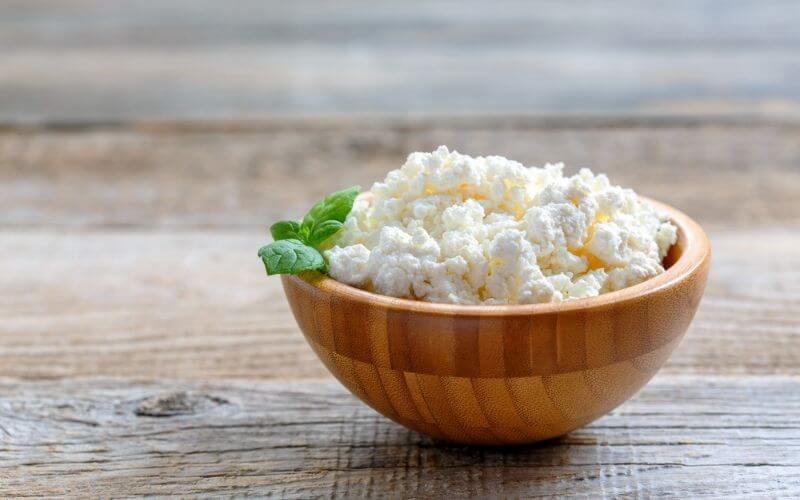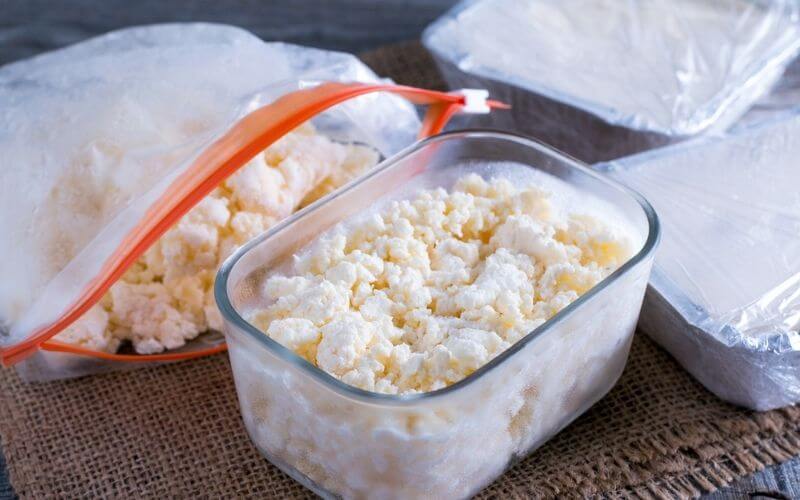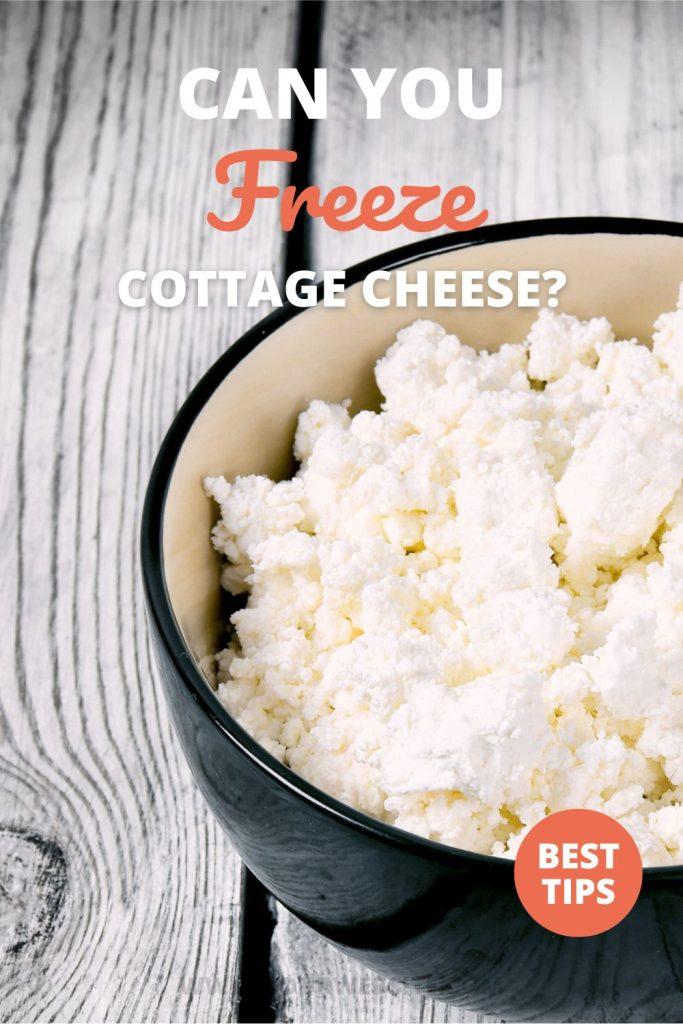Ever found yourself with an abundance of cottage cheese? You’re not alone. One time, I ended up with seven large containers of the stuff! No matter how much lasagna or casserole I prepared, a good stash remained. This led me to the pressing question: Can you really freeze cottage cheese for longer freshness?
| Article Highlights | Details |
|---|---|
| Freezing Cottage Cheese | Yes, you can freeze cottage cheese. However, freezing tends to alter the texture, making it drier. |
| Proper Freezing Steps | Choose full-fat versions, portion in advance, store in suitable containers and always mark the date. |
| Thawing Frozen Cottage Cheese | Use refrigeration or a water bath for defrosting. For soups and gravies, use the cheese directly. |
| Identifying Spoiled Cheese | Exhibits moldy odors, a yellow hue, and greenish water pockets. Always discard questionable batches. |
| Recipe Ideas | Pancakes, lasagna, casseroles, cheesecakes, soups, pastas, and salads. |
| Benefits of Freezing | Extends the shelf life of cottage cheese allowing a ready supply for up to 6 months. |
The Common Misconception
Contrary to popular belief, freezing cottage cheese isn’t taboo. However, there are some nuances to consider. In this guide, we will not only address the popular question but also provide creative recipe ideas to make with cottage cheese. So, to answer the question, yes, you can freeze cottage cheese! But how does it fare once frozen?
Freezing Cottage Cheese: What You Should Know

Cottage cheese, being a soft cheese, reacts differently to freezing compared to hard cheeses. When frozen, its texture undergoes a change, losing some of its moisture, causing it to become slightly drier. However, the taste remains unchanged. Here’s what happens:
- Texture Alteration: Frozen cottage cheese may not look as appealing, but the flavor remains consistent.
- Best Uses: Due to texture changes, it’s ideal to use frozen cottage cheese in cooked dishes, where its altered consistency won’t be as noticeable.
If you ever spot a sale and decide to stock up on cottage cheese, knowing how to freeze it properly can save you both time and money.
How to Properly Freeze Cottage Cheese

To retain as much of its original quality as possible, it’s not just about tossing it in the freezer. Does cottage cheese freeze well? With the right steps, it certainly can. Here’s how to store it efficiently for up to 5 months:
- Pick the Right Type: It’s crucial to choose full-fat versions of cottage cheese for freezing. The higher fat content ensures less moisture, making the cheese creamier and more resilient to freezing.
- Portion Size Matters: Consider your future needs. Sometimes you’ll want a small amount, other times more. Portioning them in advance saves you the hassle later on.
- Storage Containers: Using Ziploc bags, especially for liquids, can be space-efficient. However, if space permits, glass containers can also be effective.
- Date Marking: Using a waterproof marker, note down the storage date on your container. It’s a handy reminder of its freshness.
Defrosting 101: How to Thaw Frozen Cottage Cheese

Frozen cheese needs careful defrosting. Whether it’s cottage cheese or other varieties, here’s how to do it right:
- Refrigeration: Transfer your cheese from the freezer to the fridge the night before. By morning, it should be perfectly defrosted and chilled.
- Water Bath: In a hurry? Submerge the container in water. Within 40-50 minutes, it should be defrosted.
- Quick Use Tip: For gravies or soups, there’s no need to thaw. Break up the frozen cheese and use it directly. A bit of cooking and stirring should integrate it seamlessly.
How to Tell If Cottage Cheese Has Gone Bad
Ensure your cottage cheese is still good to consume. Spoiled cheese exhibits moldy odors, a yellow hue, and possibly greenish water pockets. The change is often apparent, so always prioritize your health and discard questionable batches.
Delicious Recipes Using Frozen Cottage Cheese

Forget frozen cottage cheese, most people have a polarizing view on cottage cheese to begin with. Due to its texture and look, people tend to not find it that appealing.
So they end up replacing cottage cheese with other dairy-based items like yogurt or curd. But that’s so unfortunate as you can make really delicious and nutritious recipes with it.
Frozen cottage cheese in particular is great for cooked recipes. They are very convenient as frozen cottage cheese can last up to 6 months in your freezer. So you can make these recipes at any given time.
Here are some of our most favorite dishes to make with frozen cottage cheese:
| Recipes | How to Use Frozen Cottage Cheese |
|---|---|
| Pancakes | Use thawed cottage cheese to add moistness and fluffiness, eliminate the need for baking soda. |
| Lasagna | Layer cottage cheese right from the freezer; it will thaw as it bakes, giving the lasagna enhanced creaminess. |
| Casseroles | Utilize thawed or directly frozen cheese in combination with other ingredients of your choice for both breakfast and dinner. |
| Cheesecakes | Incorporate thawed cottage cheese into your cheesecake recipe for a healthier twist. |
| Soups and Curries | You can opt for directly using frozen chunks of cheese into your soup or curry, it will melt and give a creamy texture. |
| Pastas | Works great in Alfredo sauce, macaroni and cheese and many other pasta dishes for a unique flavor. |
| Salads | Thawed cottage cheese can be paired with fresh veggies or fruits for a refreshing salad. |
Pancakes:
We had to begin with this one. Just look at the picture above. Who doesn’t want those fluffy pancakes in the morning? Give me ten of ‘em!
You don’t need to use baking soda if you use cottage cheese. You can also make waffles using cottage cheese as an alternative to milk. They turn out to be super crispy on the outside and soft on the inside.
Lasagna:
Of course, lasagna becomes extra creamy and yummy if you add some cottage cheese to the mixture. I like to use three/four different types of cheese for a better flavor profile.
Making vegetarian lasagna with cottage cheese, mozzarella and spinach is a really delicious way to get the nutritions and daily dose of fiber.
Casserole:

You can make breakfast casserole with broccoli, eggs, peas, feta, and butter. Alternatively, you can make a dinnertime version with ground beef, zucchini, mushroom, potatoes, and basically anything you want.
The possibilities are endless. A casserole is the easiest way to throw everything in the freeze to make a delicious dish!
Cheesecake:
We all have a weakness for cheesecake whether you have a sweet tooth or not. As this dessert is not very healthy, you can make it a little better for you by adding cottage cheese to it. Add cinnamon, lemon juice, and lemon zest and it will turn out to be extra refreshing.
Soups and Curry:

Now, this is something not a lot of people think about. You can add cottage cheese to creamy soups.
Not just creamy soups, think of gravy, curry, and all sorts of broths. The creaminess of cottage cheese alleviates the other seasonings and spices and it just feels very wholesome to eat.
One tip, if your gravy becomes too spicy, adding a few spoons of cottage cheese will decrease the spiciness while keeping the integrity of the dish.
Pasta:
Whether you are making chicken alfredo or some classic mac and cheese, adding cottage cheese will make it taste rich and distinctively unique. I personally love using cottage cheese with spaghetti and ground beef in tomato sauce.
Salads:

Cottage cheese is such an underrated ingredient in salads. They taste delicious and fresh with some Persian cucumbers, scallions, radishes, black pepper, and white vinegar.
If you like some sweetness to your salad, try adding apple slices to it. The cottage cheese binds all these ingredients together into a cohesive mouthful.
Takeaway
Cottage cheese is a versatile ingredient that’s even more handy when stored properly. From creative recipes to simple snacks, its applications are vast. Prioritize its quality by ensuring you freeze and thaw it the right way.
FAQs
Does cottage cheese freeze well?
Yes, especially if the freezing steps mentioned are followed.
What are the benefits of freezing cottage cheese?
It extends the shelf life, ensuring you have a ready supply for up to 6 months.
Can I use frozen cottage cheese for all recipes?
While the taste remains consistent, the texture changes. It’s ideal for cooked dishes.
More Related Article:
Pin Later

